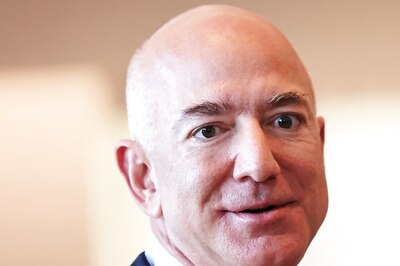
views
The timing of Rashtriya Swyamsewak Sangh (RSS) chief Mohan Bhagwat’s assertion that Hindutva has adequate space for Bharatiya Muslims may be a tad political, but it is a significant, game changing development if Sarsanchalak attempts to translate his words into deeds.
Prior to Tuesday’s remark, the RSS had steadfastly maintained that every Indian living in the country was a Hindu. Bhagwat, however, gave a more nuanced meaning while speaking on the second day of a three-day RSS lecture series event in New Delhi when he said he would “respect” the sentiments of those who wish to be called “Bharatiya” and not Hindu.
He also took the opportunity to recall Aligarh Muslim University founder Sir Syed Ahmad Khan’s words, spoken at a function organised by the Arya Samaj community to felicitate him for becoming “the first Muslim barrister”.
Khan told the gathering “Mujhe bada dukh hua ki aapne humko apne me nahin shumaar kiya… kya hum Bharat Mata ke putra nahin hain? Arre itihaas mein badal gayi hamari puja ki padyati, aur kya badla hai? (I am very upset that you did not consider me one of your own. Am I not a son of Mother India? Nothing has changed except our ways of worship).”
The RSS chief’s declaration that concept of a Hindu Rashtra does not mean it has no place for Muslims and that if Muslims are unwanted here, the concept of Hindutva will cease to exist has a potential of an epoch-making beginning if the RSS starts engaging Muslim clergy and thought leaders.
It would also be watched with interest if Sarsanchalak’s words would have any sobering impact on hate –mongers, mob-lynching instigators and cow vigilante groups who have not only indulged in wanton killings but given the country a bad name abroad.
If RSS bothers to probe further, it will know that not only Sir Syed Ahmad Khan, but a large number of influential Islamic scholars and seminaries, have all along believed in “one nation theory” (as opposed to Mohammad Ali Jinnah’s two nation theory) and composite nationalism.
These scholars and Muslim schools of thought, in fact, fought a protracted and bitter battle not only with Jinnah but poet Allama Iqbal and others to argue that India has had an Islamic presence from the early days of Islam; that the blessed soil of India was the repository of centuries of deceased holy men; and that India was Indian Muslims’ “only and beloved” home.
The Jamiat-e-Ulema (Hind) for instance, completing its 100 years since its formation, owes its staunch nationalistic flavour to its mentor Maulana Husain Ahmed Madani (1878-1957), a great son of India and scholar of repute, who participated in the country’s freedom struggle and was jailed for eight years at home and abroad.
Maulana Madani was given the title of Shaikh ul Arab wal Ajam (The sheikh of Arabs and Non-Arabs). His one of the famous remarks during the pre-independence India was, “All should endeavor jointly for such a democratic government in which Hindus, Muslims, Sikhs, Christians and Parsis are included. Such a freedom is in accordance with Islam.”
Maulana Madani passionately advocated the idea of composite nationalism and joint struggle of all religious communities against the British and justified inter-communal unity and cooperation on the basis of the Quran and the Hadith [sayings of Prophet Mohammad].
At a time when ideas of religion based nationalism were being advocated, Maulana Madani advanced “the theory of territorial national hood” saying that it is “not necessary that a nation, to be a nation, should share the same religion and culture”.
Madani and Muslim clergy of that era were described by Peter Hardy as representing “a sea change in the kind of assumptions Ulama were wont to make about the nature of solidarity of the Islamic community.”
In the process, Maulana Madani had rather fierce and engaging debate with poet Allama Muhammad Iqbal on whether the identity of a nation depends upon its land or religion.
This was the time Jinnah’s demand for Pakistan and two-nation theory was gaining currency among a section of Muslims. Madani spoke candidly in December 1937, at a political meeting in Delhi, “In the current age, qaumeen (nations) are based on autaan (plural of watan) (homelands), not religion”.
He said people living abroad made no distinction of whether a person was ‘Muslim, Hindu, Sikh or Parsi’- but viewed them as ‘Hindustani’.
Poet Iqbal unleashed a war of sorts when he penned a poem "Hussain Ahmad" in "Armaghan-e-Hijaaz’’, his book of verses in Persian saying, “Hanooz Nadand Rumooz-E-Deen, Warnaza Deoband Husain Ahmad! Aen Che Bu-ul-Ajabi As Saroad Bar Sar-E-Minbar Ke Millat Az Watan AstChe Bekhabar Za-Maqam-E-Muhammad Arabi Ast.”
A rough translation: The Ajamites (non-Arabs) do not yet know, the fine points of our faith; Otherwise Husain Ahmad of Deoband! What is this foolhardiness? A sermon-song from the pulpit that a nation by a homeland be! From the real position of the Arabian Prophet, how sadly unaware is he!
Madani responded to Iqbal, Madani justified his mutahaddah qawmivat on theological grounds, i.e. on Prophet Muhammad's "Covenant" with the Madinites (residents of Madina). The Prophet had defined all Madinites, whether Muslim or non-Muslims as belonging to one community (qawm). Madani regarded it as a legally valid precedent for the justification of Muslim alliance with Hindus in India to confront the British.
A section of Hindu right, including Sangh ideologue Pandit Deendayal Upadhyaya, was accommodating towards Muslims. In his writings and speeches, Deendayal (1916-1968) whose birth anniversary is currently being celebrated, had said he was even prepared accept a “Muslim league” (a party led by Pakistan-founder Mohammad Ali Jinnah) participating in post-independence Indian politics.
“Woh bhi bharat ka ek swatantra nagrik hai aur is prakar rajniti mein bahg lene ke liye puri tarah se haqdar hai (He too is a citizen of India and has full right to participate in politics),” Deendayal, a former Jan Sangh president said, adding, “lekin agar woh aaj bhi do-rashtra ke sidhanth ka pakshdharta karta hai to mujhe nishchit roop se aapatti hai (But if he is a still a believer in two nation theory, then I certainly have objections)”.
In mid-1967, Deendayal was asked at Raipur in a press conference about the number of Muslim members in Jan Sangh.
He replied, “We in Jan Sangh do not care to count the number of members on the basis of religion. We do not make distinction on the basis of religion. Jan Sangh is a nationalist outfit and does not care about its members’ religion or religious belief.”
In spite of repeated queries, the then Jan Sangh chief did not give names of Muslim leaders in Jan Sangh or the number of Muslims enrolled in the organisation.
Jan Sangh of Deendayal era and later years did have some Muslim presence. Writer Imdad Sabri used to represent the BJS in Delhi Metropolitan Council and rose to become Mayor. Both Maulana Ikhlaq Hussain Qasmi and Sheikh Abdul Rahman served as vice-presidents of Jan Sangh units in Delhi and Jammu and Kashmir respectively.
Anwar Ali Dehelvi and Begam Khurshid Kidwai had won several councillor elections on the BJS ticket from a Muslim dominated Jama Masjid, Delhi constituency. Kidwai had served as deputy mayor too. Former union minister and BJP leader Arif Beg, who died in Bhopal in 2016, had joined Jan Sangh in 1973.
According to Deendayal, there should be complete freedom to practice religion but there is no place of faith in politics.
“Jan Sangh ka maanna hai har sadasya ko apne dharma ke anusar puja karne ka pura adhikar hai aur party ka isse kuch lena dena naheen hai. Sanatan dharma, Islam, Christian, Arya and Jain dharma ke vyakti ho sakte hain lekin hum kisi roop se is aadhar par unke beech bhedbhav naheen kar rahe hain (Jan Sangh believes that its members have a right to practice their religion. The party has nothing to do with it. Members can be followers of Sanatam dharma, Islam, Christianity, Arya Samaj and Jainism but we would not discriminate among them),” Deendayal said.
Chaturvedi Badrinath, a former IAS officer who wrote extensively on Deendayal’s thoughts, claims the Jan Sangh leader advocated a thesis that dharma does not lie in the rule of the majority.
For Deendayal, concept of dharma was not ritualism or religion but a moral force that sustains and upholds. Badrinath insists that Deendayal disagreed with RSS head MS Golwalkar’s vision of future India as that of Hindu India.
The countdown for elections in five states of Madhya Pradesh, Chhattisgarh, Mizoram, Telengana, and Rajasthan has begun and 2019 Lok Sabha polls are round the corner.
Some Muslim community leaders feel if the idea behind Bhagwat’s utterances is to merely package inclusiveness plank, the move would not cut much ice. But if engagement, sustained efforts and attempts to translate words into deeds are on the table, Bhagwat remarks have a game-changing potential.
(The author is visiting fellow at the Observer Research Foundation and a journalist. Views are personal)


















Comments
0 comment